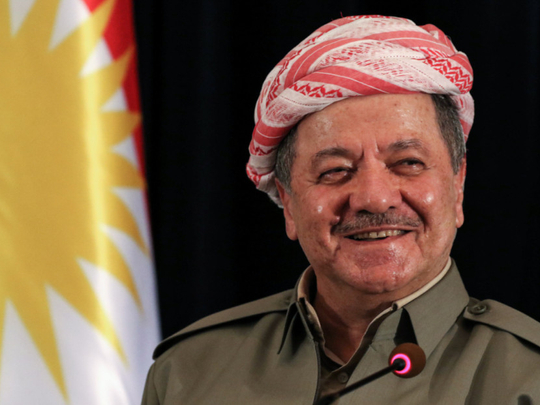
Barzani was not able to turn himself into a national leader and achieve the dream of his people for independence, said the UAE’s Al Khaleej. “Perhaps Barzani was given promises and assurances from certain parties that they would stand by him if he decided to separate from Iraq, but once push came to shove, he found himself alone. Barzani paid a heavy price for his miscalculations, foiling the aspirations of his people after he supposedly paved the way to achieve independence. He misled the people, making them believe that the dream was within their grasp and that all they had to do was vote ‘yes’ at the ballot boxes in the Kurdish referendum. This miscalculation dealt a severe blow to Barzani’s presence as a political leader, who dreamt of being a historic leader for the Kurdish people,” the paper said.
Barzani’s calling of the September 25 independence referendum was in fact the act of an incompetent leader, whose subsequent resignation should not be regretted, even by his most ardent supporters, said the Saudi Gazette.
“Before making such a fatal move, an adroit politician would have ensured that he was not leading his people into an international vacuum. He would have lined up at least some countries to support his independence bid. He would also have taken care to try and sell the case to the seriously-concerned minorities within the territory over which he held sway. In his tearful resignation speech on Sunday, Barzani blamed ‘the traitors’ in the Pershmerga forces who retreated from Kirkuk and its oil field with hardly a shot after Baghdad sent in government forces. History will very probably actually mark these fighters as heroes who avoided drawing yet another bloodbath in a country already scarred with terrible violence.”
The Iraq quagmire
In an editorial concerning Iraq, the Jordan Times wrote that when the country will have flushed out all terrorists, the challenging task of reconstruction will have to be carried out by Baghdad. “Even more formidable will be the effort to re-establish the unity of the Iraqi population, now deeply divided along sectarian lines, scarred and distrustful. No military success will be worth much if the country’s policy does not work to heal the wounds and bring people together in an inclusive, democratic system of governance. Reconciliation with the Kurds in the north is now at the forefront of domestic issues that await resolution. Winning the battle against the Kurdistan Regional Government’s decision to secede from Iraq could be the easy part; winning the trust and collaboration of all ethnic groups will be harder, if at all possible. Once Daesh is out of the picture, Iraqi Prime Minister Haider Al Abadi will have a lot on his plate.”
Illegal immigration
On Palestine, Lebanon’s Daily Star said that nearly 70 years ago, and as hostilities between Palestinians and the Jews were taking a turn for the worse, Jewish extremists blew up the British Officer’s Club on King Road in Haifa. “This followed the British massacre in the King David Hotel bombing in [occupied] Jerusalem, in a series of events that expedited the withdrawal of the mandate from Palestine, as if it were ‘mission accomplished’ ... The British left without fully implementing the Balfour Declaration, and after turning a blind eye for more than 20 years to the illegal immigration of Jews from across the world, the supply of arms and the training of Zionist militias that committed crimes against humanity to force a people from their land.”




_resources1_16a31069e4e_small.jpg)







